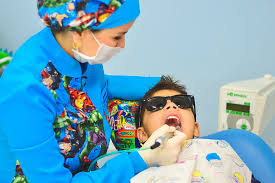Pediatric dentistry emphasizes forming good dental hygiene habits early in life. For children, trips to the dentist and daily brushing can feel tedious or even intimidating. Making dental care fun and educational is key to building healthy habits that last into adulthood. Using innovative tools designed specifically for children can help transform oral care into an engaging experience.
Encouraging Daily Brushing
Interactive toothbrushes are a great way to get children excited about brushing. These brushes are often equipped with features like music, timers, and lights. Some even connect to smartphone apps, gamifying the experience by rewarding children for brushing thoroughly or for the right amount of time. The feedback and interactive nature of these brushes turn a mundane task into one they look forward to each day.
Smart toothbrushes designed for kids introduce proper brushing techniques while keeping their attention. Some models use built-in sensors to guide them through cleaning different parts of the mouth. This combination of technology and fun promotes more effective brushing without making dental care feel like a chore.
Learning with Dental-Themed Toys
Dental-themed toys play a useful role in teaching children about oral hygiene. Playsets featuring plastic teeth and tools familiar from a dentist’s office allow kids to explore their curiosity. Pretend play scenarios help demystify dental visits and create a positive association with oral health care. Books and games are also excellent tools for supporting learning. Children’s stories that highlight dental characters or explain brushing and flossing in simple terms resonate well with young audiences. Board games or puzzles related to dental hygiene combine fun and knowledge, making kids more receptive to adopting healthy practices.
Educating Tools Built for Home Use
To help instill dental care habits, educational tools for the home are designed specifically with children in mind. Brushing charts or calendars allows kids to track their progress, motivating them to stay consistent. Including a reward system linked to these charts further reinforces positive behavior.
Timers designed for children are another effective way to encourage proper brushing duration. Colorful sand timers or timers with sound effects keep kids focused and engaged. These small tools demystify the recommended two-minute brushing rule, preventing rushed or incomplete cleaning. Families can incorporate these resources into their daily routines to make dental care feel less like a task and more like a shared experience between parents and children.
Flossing can be challenging for children due to both technique and motivation. Kid-friendly flossers address these challenges with simple designs tailored to smaller hands. Often, these flossers come in various shapes, colors, or characters to catch a child’s interest. Flossers with easy-grip handles make it simpler for younger users to maneuver between their teeth. These tools are an excellent introduction to flossing, and their fun themes encourage children to adopt the habit more effortlessly.
Building a Positive Connection with the Dentist
The role of dental professionals extends beyond routine check-ups, as they often introduce engaging tools and techniques to promote dental care. Some pediatric dentistry practices feature kid-friendly waiting areas equipped with toys, books, or even interactive displays. These elements create a welcoming environment, easing the anxiety some children feel about visiting the dentist.
Dental professionals can also introduce tools like disclosing tablets during appointments. These tablets highlight areas of plaque build-up, offering a teaching moment to explain brushing techniques or areas requiring extra attention. This makes appointments more hands-on and educational for children while involving parents in their child’s dental care.
Nurture Lifelong Dental Habits with Pediatric Dentistry
By incorporating fun and educational tools into their routine, parents and educators foster positive attitudes toward oral hygiene at a young age. Kids are more likely to maintain these habits if they see dental care as an enjoyable part of their day rather than an obligation.
- Zirconia Cap Price: Estimated Cost & Its Long-Term Benefits
- FREHF – The Revolutionary Future Of Human-Centered Technology!
- Adsy.Pw/Hb3 – Boost Your SEO And Drive More Traffic!
- Fitness Based Vacations By Timeshealthmage.com!
- TimesHealthMag Tips For Improving Sleep Quality – Expert Advice For Better Rest!


Leave a Reply